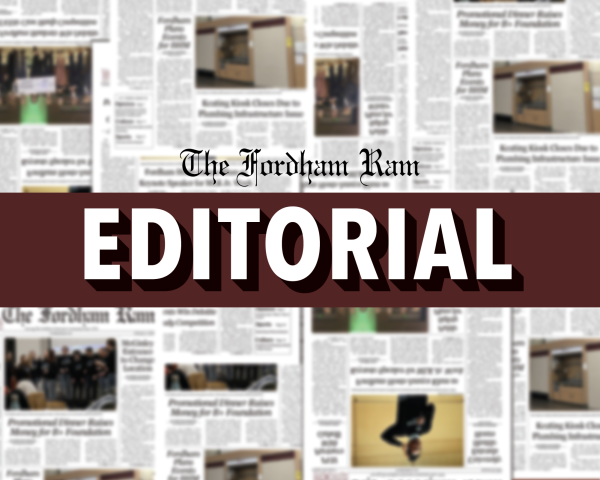Talk the Talk to Better the Run
In speaking out on such personal experiences from a position of notability within the community, Cain has furthered invaluable dialogue and used her platform to make a difference.

Recently, world-champion runner Mary Cain, GSB ’19, released a video op-ed with the New York Times detailing the emotional and physical abuse she suffered during her time with Nike’s Oregon Project, formerly the top running program in the United States.
The Ram stands with the Fordham alumna in calling for increased attention to gendered issues within running and greater athletic communities and for the protection of athlete health at large.
Such bravery by Cain not only deserves our attention but also requires our participation in the conversations needed to address the systemic problems her story brings to light.
In her op-ed, Cain discusses the obsessive emphasis her former coach Alberto Salazar placed on her weight as it related to her competitive performance.
It is true that a relatively low body weight can be beneficial for some runners. Lower body fat percentages translate to lower energy costs, which result in increased endurance, speed and agility. Similarly, there is some logistical and scientific credibility to the idea that one might run faster if they simply had less weight to carry.
However, the relationship between low weight and athletic success is by no means infinitely direct. Weight loss can quickly become dangerous if obtained in excess, and lack of proper nutrition can lead to many issues, both mental and physical, and nonetheless all negatively affecting athletic performance to some degree.
When athletes consistently consume too few calories for the activity level that rigorous workouts require, they can develop Relative Energy Deficiency in Sports (RED-S). Such insufficient levels of energy in the body impact hormonal pathways and impair metabolic rate, menstrual function, bone health, immunity, protein synthesis and cardiovascular health, according to the University of Wisconsin Hospitals and Clinics Authority.
In women, RED-S manifests itself as disordered eating, loss of menstrual periods and decreased bone mineral density. Such symptoms are particularly detrimental to female health because of the potential long-term complications they pose, such as infertility and osteoporosis.
Equating leanness with athleticism breeds a culture that idealizes thinness at the expense of overall health, and no accolade is worth the deterioration of one’s well-being.
Competing in a sport at any level involves heightened physical and mental stress, which necessitates certain amounts of rest, recovery and nutrition. It is imperative that athletes not only take care of themselves but are given the proper support from coaches, programs and teammates to succeed.
Athletes should never be pressured into sacrificing their welfare for the benefit of a program, and it is abhorrent that Salazar and the rest of the Nike team would show such a severe lack of human decency by requiring their runners to do so.
Many members of the Fordham program agree that the university does a good job of providing resources that allow for student athletes to thrive.
“The athletic department as a whole prioritizes the student athlete experience,” said Brian Horowitz, head coach of the Fordham cross country and track & field (XC/TF) teams. “Our track and field staff works closely with the medical training staff, strength training staff, sports psychologist, health center/counseling center and academic advising to provide a healthy and successful career here at Fordham.”
Horowitz said he and his coaching staff take an individualistic approach to training and emphasize the importance of sleep, nutrition and hydration.
“We as a school need to continue to put the person and their general well-being first,” he said. “Athletics should be fun and competitive. Winning is always a great feeling, but success should not and need not come at the cost of physical and mental suffering.”
Such methods are appreciated by Horowitz’s runners and prove a stark contrast to the ethos Cain found herself a part of at the Nike Oregon Project.
“Fordham Track & Field has a new head coach in addition to a new trainer, and at the beginning of the year it was made clear to us that both of them were hired because their centers of value are whatever is best for each individual on the team,” said sophomore Bridget Alex, FCRH ’22, of her experiences running with the TF team. “I’m sure my teammates agree with me when I say we began to see this from them even after the first few weeks of practice.”
However, there is always room for growth particularly as it relates to increased gender diversity within positions of power in sports.
Cain — who attributes her mental and physical deterioration to what she describes as an all-male coaching staff — said female runners participate in a system designed for and by men, which destroys the bodies of young girls. Fordham’s program, though male dominated, seems successful in avoiding similar problems.
“Every individual regardless of gender has certain strengths and weaknesses,” Horowitz said. “As coaches we need to figure out how to turn those weaknesses into strengths.”
“Our team and coaches do a good job of checking on us, making sure we are feeling good, and feeling healthy,” sophomore Kaley Bell, FCRH ’22, of the TF team said. “I do wish to see more women representation in the coaching staffs and the athletic department. Fordham is working to change that, and I can’t wait to see the direction that they will go in terms of representation.”
It is uplifting to hear of such optimism within Fordham’s programs, as well as to see the widespread support of Cain from other prominent figures in running community, such as Olympian and former Nike athlete Amy Begley and former Nike coach Steve Magness.
But as changes continue to unfold within Nike as a result of Salazar’s doping violations and subsequent suspension, it is crucial that such voices continue to expose the deep-rooted problems within the sport. Only increased awareness and action can begin to breakdown the problematic culture that allowed Salazar and his team to run rampant in the first place.
In speaking out on such personal experiences from a position of notability within the community, Cain has furthered invaluable dialogue and used her platform to make a difference. We are extremely proud of our fellow Ram and encourage everyone to keep up with her story and others that come to light as the situation develops.










































































































































































































